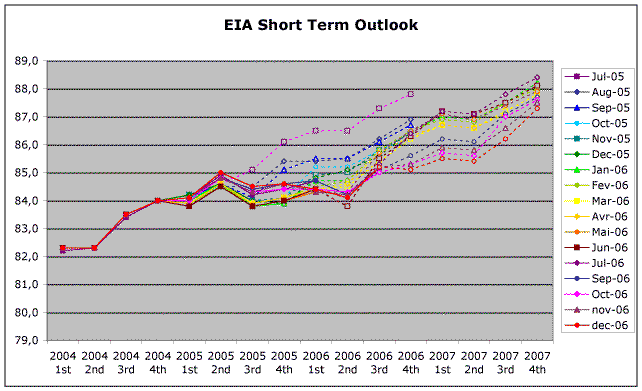He thinks the course of the clusterfuck is at least a little predictable. I think it's now completely unpredictable, and deliberately so.
I think that a considerable amount of effort has been put into obfuscation, to prevent panics and market collapses. It was the reason, IMHO, for OPEC's massive revisions of oil supply figures in 1986 and 1995. The less useful information we have on the crisis, the less chance there will be of a rapid worldwide economic crisis and collapse. But hard times will come, none the less.
Of course, I concur with Kunstler's overall analysis. It's just that the process of getting there is going to be delayed as long as possible, and "engineered" into a long, slow, painful slump, as is already happening in the real estate market.
For one thing, oil production has been flat for a year and a half, right around the 84-85 Mbbl level. Over the last two years, all production forecasts have been lowered -- consistently.
 (From Tracking the EIA Short Term Forecasts by GillesTheFrog at The Oil Drum.)
(From Tracking the EIA Short Term Forecasts by GillesTheFrog at The Oil Drum.)Getting accurate information from OPEC is like pulling teeth, and non-OPEC sources are scarcely better. Nobody wants the
bon temps to stop
roulant, and derived figures like the EIA Short-Term Outlook are all we have to go on. It is quite possible that Ken Deffeyes' tongue-in-cheek prediction for Peak Oil to hit on Thanksgiving Day, 2005, at 2:30 PM EST was on the money; with a completely symmetrical plateau around that date, we should be feeling the first shocks soon, although I think we have another couple years on the plateau yet. But it's not lookin' good.
My second big point is that JHK has overlooked his own point about the economic system now being based on confidence tricks, hot air, and slight-of-hand. I believe that such legerdemain can be sustained longer than Kunstler thinks -- else we would have had a strictly economic reckoning long ago. Remember, it was in 1971 that Nixon gutted the postwar Bretton Woods agreement that kept currencies stable and pegged to the Dollar. Bretton Woods probably needed some modification to keep up with Europe's postwar development and the emergence of the African and Asian economies, but Nixon's policy was rather like shaking up a pop bottle until it burst. This led (again, IMHO) to 35 years of highly speculative finance, financial value creation based almost entirely on the same kind of confidence from which the term "con" is derived. Certainly, real wealth has been created since 1971, but also certainly much less than the paper wealth that has supplanted it. A "reckoning", or economic re-alignment, wouldn't have been nearly as lucrative. In contrast, the pre-Depression speculation run-up of the 1920s only spanned about a decade, from the end of World War One, and there were far fewer mechanisms to keep the go-go years going. It was also limited to certain financial markets, like the Stock Market, and
began with a crash, the rather more limited European currency crash of 1921-1923. It was the effect of finance capitalism wobbling and falling like a baby learning how to walk, not the exhaustion and collapse of an over-stressed and long-doped athlete at the breaking point.
I am not crying doom in the desert, however. America, as well as most of the world, has no shortage of people who are willing to work to create
real wealth, not just buy into get-rich-quick schemes. With even modestly competent leadership, we could weather a severe depression; that's not my concern. I'm worried that a cascade of financial, political, resource, energy, and climate crises could wipe out a century of physical infrastructure and huge numbers of people. The destruction would be enormous, and the human cost in deaths could likewise be staggering.
I think Jim Kunstler would agree with that, at least the gist of it. So, my only real disagreement with Kunstler is that he trusts economic gravity more than I do. We both agree that the hot air is heated with oil; I just happen to think that it's wafted a lot higher than he does.
--p!